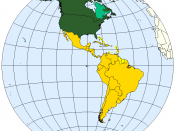Exotic diseases are one of the greatest threats to humanity. In a world where so many things are overlooked, diseases and epidemics are clearly overlooked and underestimated far more than any threat of nuclear war, global warming, or any comet headed for earth. Throughout history epidemics have plagued the earth several times resulting in a devastating number of deaths. In this new millennium, many new and old diseases await humanity. What the world doesn't comprehend is that an epidemic can be easily spawn off by many other problems humanity faces today.
Some of those problems are high population density, newly inhabited areas, increased travel, new generation without immunity, mutation in microbes, over use of antibiotics, poverty/poor sanitation, and change in human activities. Diseases come into existence, change, and vanish, but some have always been with us. An epidemic attacks a population, it and runs its course, and then dies out, claiming hundreds to thousands of lives.
There are ways of preventing some epidemics from starting, but not everyone agrees with the terms. Thus, these prevention plans for some diseases fail. Humanity is faced with many dangers of a doomsday in the next millennium, but the one that seems the most likely to happen is a world epidemic. Pg. 2 Human activities and behavior often help increases the risk of a world epidemic. In such activities like increased travel, shipments of resources and wild animals increase the possibility of catching a deadly virus and starting to spread an epidemic. Human behavior such as neglect can determine the fate of a world epidemic. Most people believe that Ebola or any other exotic disease would spawn off and epidemic only in third world countries, but thatôs not true. In 1989 Ebola made itôs way to the United States. The virus hit Virginia, but...


